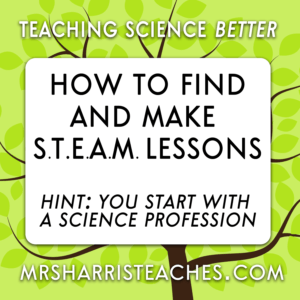How Starting with a Science Profession is an Easy Way to Find and Make STEAM Lessons
To sum it up, researching about a science profession can provide inspiration and build background knowledge to help you find pre-made STEAM lessons or create your own STEAM lessons!
Disclaimer: This is just one method that works for me. Easy is a matter of opinion. What I outline below is a creative process and I definitely fall in the camp of thinking creativity can be learned. (I’m not the only one; read more here, here, and here!) Creative processes, like many things in life, DO get easier with practice. This process is not set in stone, so yes, yes, yes, modify it to your way of thinking. This is definitely not the only way to find and create STEAM lessons.
STEAM is all about integration and inquiry. Using science professions is an easier way to come up with STEAM activities.
Real world applications generally involve the integration, or combining, of ideas from different areas. For example, this interesting application involves volcanologists simulating volcanic eruptions by detonating underground explosives. This real world example integrates science, engineering, technology, and more. Science, in itself, is inquiry. The process of figuring something out is often a key part of a scientist’s job.
So, science professions apply science to the real world and naturally involve integration and inquiry needed for STEAM.
These are the steps for how to use a science profession as inspiration to make a STEAM lesson:
- Pick a science profession that you find interesting and/or connects to your curriculum.
- Research the science profession. Look up the who, what, how, and/OR why. You don’t need to research all the things I have listed below. You only need to search until you find an idea that you can use to create an activity.
- The “Who”: Find an actual person who works in this profession now. Twitter can be great for this!
- The “What”: If you found a person, what are they specifically studying? Or, in a more general sense, what are people in this profession doing? Do a simple of google search of “science profession + news”. Or, try a search in specific science related news outlets like here or her.
- The “How”: How does someone in this profession do the job? What skills do they use?
- The “Why”: What is the importance of this profession? What advancements have been made as a result of scientists in this profession?
Let’s use the volcanologist example I gave above to try and create a STEAM activity for kids.
Now for me, actually detonating underground explosives with children in a public school classroom is impossible. But, I still want my students to SIMULATE an eruption that is similar to the volcanologists in this story – this is my goal. The plain ole’ baking and vinegar volcano isn’t going to result in what I am hoping to achieve. I want my students to have the opportunity to be volcanologists.
At this point, I actually just googled “volcanologist stem activity” and quickly found this idea from TeachEngineering using a balloon, water hose, and sand. I could just demo this to the class, but I want 6-8 lab groups to do this activity on their own. I pivot and think, I can do this with just a water balloon. Filling up a balloon with water, tying it off, and covering it with sand is what I picture. I find one, ONE video providing visual confirmation that this can work. And just like that, I went from the impossible to possible.
Admittedly, there are still kinks to work out for the water balloon idea, but this idea is still good and the process is valid. Even the aspects of this idea that aren’t perfect can be grounds for great science discussions. For example, does a balloon implode or explode? What does a water balloon look like in slow motion when it pops? What could be put inside a balloon besides water that could better help it mimic a volcanic explosion when it pops? You get the idea.
I know it is tempting to ONLY do a search using the keywords “stem activity + [insert name of science profession here]” to find a pre-made STEAM lesson, but do you and your students a favor and do some research about the related science profession. My search led to the cool volcanologist detonating explosives story (which I will share with students), Allison Graettinger – a volcanologist featured in the story (who I will also share about with students), my goal, and ultimately my STEAM lesson idea. Learning about a science profession helps you focus on science skills and applied science concepts. It puts you in a frame of mind conducive to creating an integrated inquiry (STEAM) lesson.
I encourage you to take the extra step. I’m excited to hear about what you find!


Leave a Reply